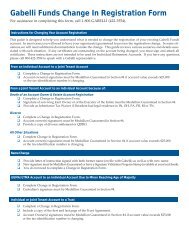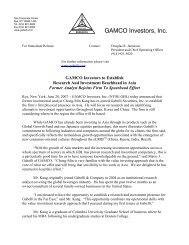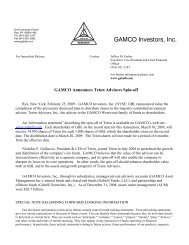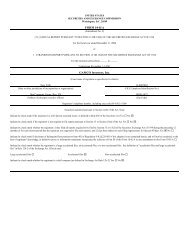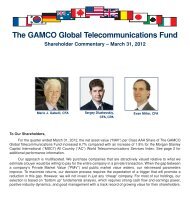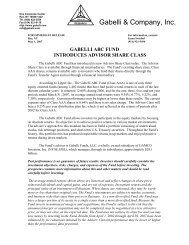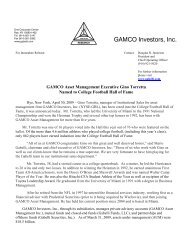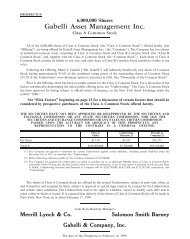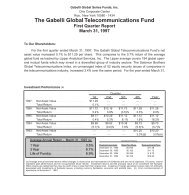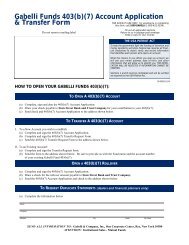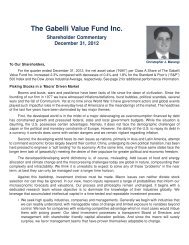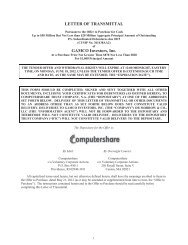Statement of Additional Info - Gabelli
Statement of Additional Info - Gabelli
Statement of Additional Info - Gabelli
Create successful ePaper yourself
Turn your PDF publications into a flip-book with our unique Google optimized e-Paper software.
nevertheless, would be taxable to the shareholder as ordinary income or capital gain as described above, even though,<br />
from an economic or investment standpoint, it may constitute a partial return <strong>of</strong> capital.<br />
The Funds may invest in stocks <strong>of</strong> foreign companies that are classified under the Code as passive foreign investment<br />
companies ("PFICs"). In general, a foreign company is classified as a PFIC under the Code if at least one-half <strong>of</strong> its<br />
assets constitutes investment-type assets or 75% or more <strong>of</strong> its gross income is investment-type income. Under the PFIC<br />
rules, distribution <strong>of</strong> accumulated earnings or gain from the sale <strong>of</strong> stock <strong>of</strong> the PFIC (referred to as an "excess<br />
distribution") received with respect to PFIC stock is treated as having been realized ratably over the period during which<br />
the Fund held the PFIC stock.<br />
A Fund itself will be subject to tax on the portion, if any, <strong>of</strong> the excess distribution that is allocated to the Fund's holding<br />
period in prior taxable years (and an interest factor will be added to the tax, as if the tax had actually been payable in such<br />
prior taxable years) even though the Fund distributes the corresponding income to shareholders. All excess distributions<br />
are taxable as ordinary income.<br />
A Fund may be able to elect alternative tax treatment with respect to the PFIC stock it holds. One election that is<br />
currently available, provided the appropriate information is received from the PFIC, requires a Fund to generally include<br />
in its gross income its share <strong>of</strong> the earnings <strong>of</strong> a PFIC on a current basis, regardless <strong>of</strong> whether any distributions are<br />
received from the PFIC. If this election is made, the special rules, discussed above, relating to the taxation <strong>of</strong> excess<br />
distributions, would not apply. In addition, other elections may become available that would affect the tax treatment <strong>of</strong><br />
PFIC stock held by a Fund. Each Fund's intention to qualify annually as a regulated investment company may limit its<br />
elections with respect to PFIC stock.<br />
Because the application <strong>of</strong> the PFIC rules may affect, among other things, the character <strong>of</strong> gains, the amount <strong>of</strong> gain or<br />
loss, and the timing <strong>of</strong> the recognition <strong>of</strong> income and loss with respect to PFIC stock, as well as subject a Fund itself to<br />
tax on certain income from PFIC stock, the amount that must be distributed to shareholders by a Fund that holds PFIC<br />
stock, which will be taxed to shareholders as ordinary income or long term capital gain, may be increased or decreased<br />
substantially as compared to a fund that did not invest in PFIC stock. Investors should consult their own tax advisors in<br />
this regard.<br />
Dividends and interest paid by foreign issuers may be subject to withholding and other foreign taxes, which may decrease<br />
the net return on foreign investments as compared to dividends and interest paid by domestic issuers. The Funds do not<br />
expect that they will qualify to elect to pass through to its shareholders the right to take a foreign tax credit for foreign<br />
taxes withheld from dividends and interest payments.<br />
The Funds will be required to report to the Internal Revenue Service all distributions <strong>of</strong> taxable income and capital gains<br />
as well as gross proceeds from the redemption or exchange <strong>of</strong> Fund shares, except in the case <strong>of</strong> exempt shareholders,<br />
which include most corporations. Under the backup withholding provisions, distributions <strong>of</strong> taxable income and capital<br />
gains and proceeds from the redemption or exchange <strong>of</strong> the shares <strong>of</strong> a regulated investment company may be subject to<br />
withholding <strong>of</strong> U.S. federal income tax at the rate <strong>of</strong> 28% in the case <strong>of</strong> non-exempt shareholders who fail to furnish the<br />
Funds with their taxpayer identification numbers and their required certifications regarding their status under the U.S.<br />
federal income tax law. If the withholding provisions are applicable, any such distributions and proceeds, whether taken<br />
in cash or reinvested in additional shares, will be reduced by the amounts required to be withheld. Corporate<br />
shareholders should provide the Funds with their taxpayer identification numbers and should certify their exempt status in<br />
order to avoid possible erroneous application <strong>of</strong> backup withholding. Backup withholding is not an additional tax and<br />
may be credited to a taxpayer’s overall U.S. federal tax liability if the appropriate documentation is provided.<br />
Sale or Redemption <strong>of</strong> Shares<br />
Upon the taxable disposition (including a sale or redemption) <strong>of</strong> shares <strong>of</strong> a Fund, a shareholder may realize a gain or loss<br />
depending upon its basis in the shares. Such gain or loss will be treated as capital gain or loss if the shares are capital<br />
assets in the shareholder’s hands, and will be long term or short term, generally depending upon the shareholder’s holding<br />
period for the shares. Non-corporate shareholders are currently subject to tax at a maximum rate <strong>of</strong> 20% on capital gains<br />
resulting from the disposition <strong>of</strong> shares held for more than twelve months (25% in the case <strong>of</strong> certain capital gains<br />
distributions from REITs subject to depreciation recapture; zero if the taxpayer is, and would be after accounting for such<br />
gains, subject to the tax brackets below 25% for ordinary income). However, a loss realized by a shareholder on the<br />
disposition <strong>of</strong> Fund shares with respect to which capital gains dividends have been paid will, to the extent <strong>of</strong> such capital<br />
69




